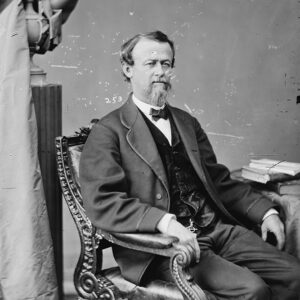calsfoundation@cals.org
James Thomas Elliott (1823–1875)
James Thomas Elliott was a Republican member of the U.S. House of Representatives. He represented the Second District of Arkansas in the Fortieth Congress, serving briefly in 1869.
James T. Elliott was born in Columbus, Georgia, on April 22, 1823. He received his education in the local common schools and then studied law. Admitted to the bar in 1854, Elliott began a private practice in Camden (Ouachita County). In 1858, Elliott was named president of the Mississippi, Ouachita and Red River Railroad, which was embroiled in a number of legal battles. Elliott was unable to achieve a solution, however, and the railroad’s general status remained unresolved as the Civil War approached.
Elliott was reported to have opposed secession during the extended debates that marked the state’s decision to leave the Union. But when Arkansas seceded in May 1861, Elliott joined the Confederate army, rising to the rank of major. He was named provost marshal for the Second District of Arkansas, which was a large responsibility, especially in the central part of the state. In that role, he had to keep order among the men in the army between military engagements. He had to maintain peaceful relations between the army and the local citizens, while overseeing soldiers’ activities at hotels, bars, and gambling houses. He also executed searches, seizures, and arrests among the local population while also dealing with both deserters and prisoners of war.
Later, he was named enrolling officer and commandant of conscripts for the southwestern quarter of the state, giving him command of both the local militia and the army units. In that role, Elliott had to address a significant dissident population, as that particular area of Arkansas was noteworthy for a lack of support for the Confederate cause.
With the end of the war, Elliott returned to the practice of law. He served as circuit judge of the Sixth Judicial Circuit of Arkansas from October 2, 1865, until September 16, 1866. He also founded the South Arkansas Journal in 1867, a publication he also edited. Elliott, a practical businessman, became active in the Arkansas Immigration Aid Society, an organization that recruited both northern and foreign immigrants in an effort to secure the labor necessary to revive the state’s economic fortunes. Elliott aligned with the Republicans during Arkansas’s fractious Reconstruction era, winning a special election for a seat in Fortieth Congress, an election necessitated by the assassination of Congressman James Hinds in 1868.
Elliott’s time in office was brief, as he served only from January 13, 1869, until March 3, 1869. While he sought election to a full term, he was defeated by Anthony Astley Cooper Rogers in the November 1868 contest. Despite his status as a “scalawag,” his defeat in the 1868 contest did not mark the end of his public career. Rather, with the Republicans still holding power, Elliott returned to Arkansas, and he was elected to the Arkansas Senate in 1870. Two years later, he was appointed judge of the Ninth Judicial District, a position he held until the adoption in 1874 of the new state constitution.
Elliott and his wife, Augusta Brooks Elliott, had four children, two of whom died from yellow fever on the same day, shortly after the end of the war.
Elliott died in Camden on July 28, 1875. He is interred in Camden’s Oakland Cemetery.
For additional information:
“Death of Hon. J. T. Elliott.” Arkansas Gazette, July 29, 1875, p. 1.
“James Thomas Elliott.” Biographical Directory of the United States Congress. http://bioguide.congress.gov/scripts/biodisplay.pl?index=E000123 (accessed September 13, 2021).
Obituary of James Thomas Elliott. Arkansas Gazette, July 31, 1875, p. 1.
William H. Pruden III
Ravenscroft School
 Politics and Government
Politics and Government James T. Elliott
James T. Elliott 




Comments
No comments on this entry yet.